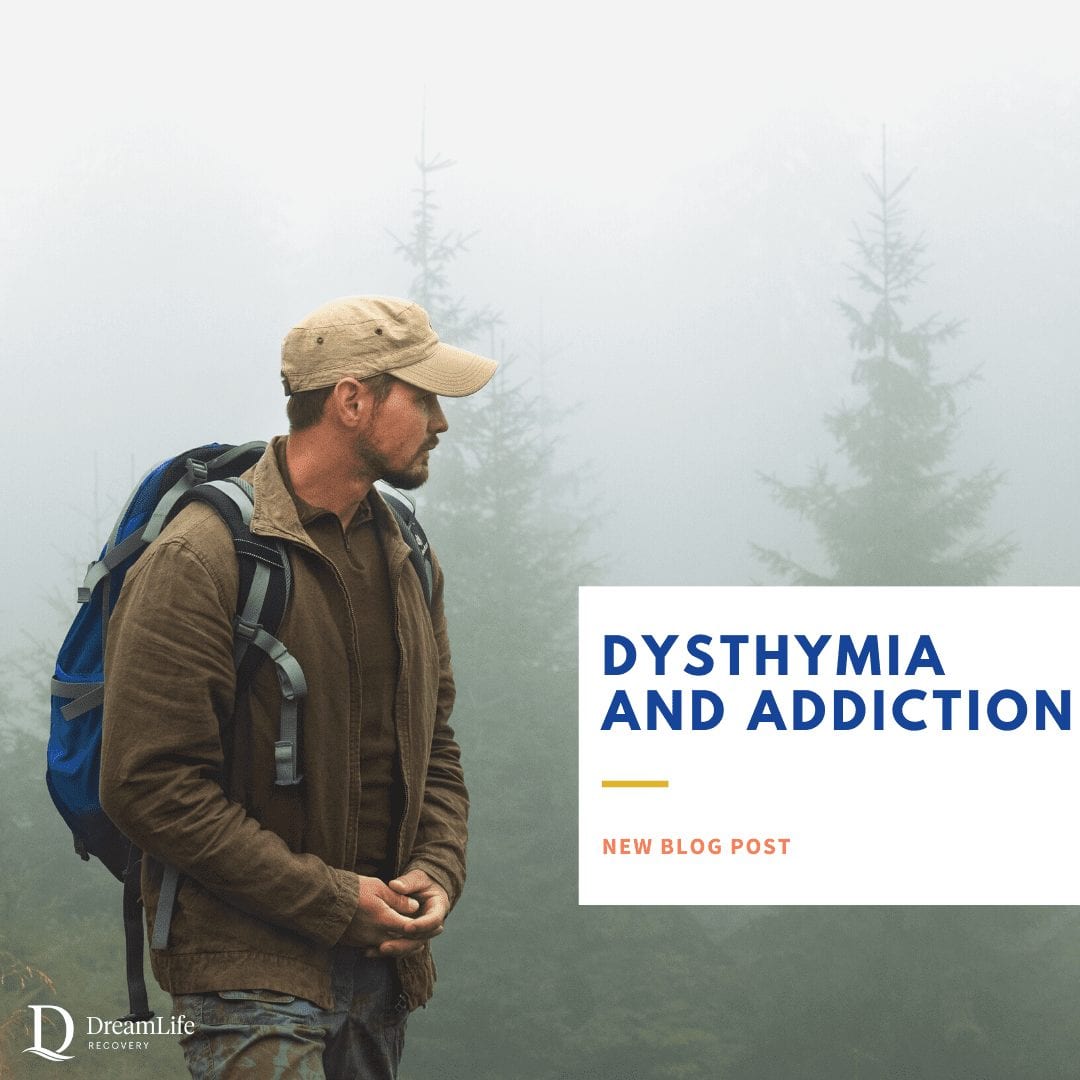Dysthymia and Addiction


Written By
DreamLife RecoveryWhile most people have heard of depression, a lesser-known type of this mood disorder is called dysthymia. Dysthymia is a form of chronic, low-level depression characterized by more mild symptoms that come and go in cycles. Unlike a major depressive episode, someone with untreated dysthymia may be able function normally in day-to-day life but may do so feeling subdued, irritable, tired, and sad.
To understand how dysthymia could be linked to addiction, it is important to understand more about the mood disorder and how it affects people.
What is Dysthymia?
Also known as persistent depressive disorder (PDD), dysthymia is a mood disorder of a chronic nature with low-level depression symptoms lasting two or more years. These periods of depression may be punctuated by periods with no symptoms or an improvement in symptoms for up to two months. People with dysthymia may sometimes experience major depressive episodes, but unlike major depression, the depressive symptoms people experience with a dysthymic disorder are typically less severe and can come and go.
Every individual will have a unique experience with dysthymia. Some people may be able to continue to lead a relatively normal life, engaging in their daily activities and relationships with less impairment than typically seen in major depression. For others, dysthymia can lead to a more serious impairment and cause disruptions to daily life. Causes of dysthymia could relate to imbalances in brain chemistry, past traumas, family history, or other biological factors. According to the National Institute of Mental Health, 1.3 percent of adults in the U.S. may experience dysthymia at some point in their lives.


Signs of Dysthymia
Without knowledge about the condition, signs of dysthymia could be overlooked, particularly if they are more subtle. Symptoms could be misattributed to factors other than mental health or could be ignored. The Diagnostic and Statistical Manual of Mental Disorders (DSM-V) classifies dysthymic disorder as having two or more of the following symptoms most days during two years or more:
- Feeling hopeless or pessimistic
- Feelings of worthlessness or low self-esteem
- Anxiety or irritability
- Fixating on guilt or worrying about the past
- Lack of interest in activities you used to enjoy
- Having low energy or fatigue
- Changes in appetite or eating habits
- Sleep issues
- Trouble focusing or making decisions
In children and adolescents, dysthymia may appear as a low energy, moodiness, aloofness, or increased irritability lasting for a year or longer. Onset of dysthymic disorder is typically in adolescence.
Is it Linked to Addiction?
Research done on addiction and mental health comorbidities suggests that common causal factors that predispose a person to develop dysthymia and a substance use disorder could explain why these conditions co-occur. For a person managing dysthymia, there may be a greater risk of substance use, particularly if the condition has not been diagnosed or treated.
Even for those with diagnosed dysthymia, using alcohol or drugs to deal with symptoms could turn into a substance abuse problem. Substance use can aggravate the condition and lead to an unhealthy pattern of use, dependence and eventually, addiction.
How Sobriety Can Help You Mentally and Physically
Find Out MoreThe link between dysthymia and addiction can be difficult to establish. A person struggling to cope with the negative side effects and symptoms of dysthymia may turn to alcohol or drug use to self-medicate. Substance abuse can aggravate symptoms of depression, and the worsening symptoms can prompt the person to use drugs or alcohol more to dampen the effects of the mood disorder.
However, if the problematic substance use began first, it could be a causal factor for chronic depression because of the changes heavy alcohol or drug use effect on the brain. This can result in the development of a cycle in which both the depressive disorder and the substance use disorder become unmanageable, each further exacerbating the other.
How to Help
If you or someone you care about seems to be struggling with dysthymia and addiction, it is time to seek help. Only a trained therapist or psychiatrist can diagnose dysthymia and/or a substance use disorder. However, you know yourself or your loved one and can recognize when something is wrong. Be compassionate and open when you communicate your concern.
It is not recommendable to try to treat addiction and depression alone. These conditions should be addressed by dysthymia specialists who can accurately diagnose and treat these co-occurring conditions. To help someone with dysthymia and addiction means finding them an addiction treatment program, where they can start to heal with the help of professionals.
Often in addiction treatment, the clinicians can diagnose depression once the substances of abuse are no longer a factor after detoxing and abstinence. In some cases, the depressive symptoms may start to improve with sobriety, but if the symptoms of depression continue and the person is diagnosed with dysthymia, additional treatments such as selective serotonin re-uptake inhibitors (SSRIs) or other anti-depressant medications may be prescribed along with talk therapy and other complementary healing modalities.
If you are feeling like your substance use is out of control, there is no shame in seeking help. If you are helping a loved one, offer support to help them find treatment. An individualized treatment program that offers dual diagnosis can help address underlying mental health conditions and substance abuse simultaneously for those dealing with co-occurring disorders.
Resources:
- DSM5 Diagnostic Criteria Persistent Depressive Disorder – Cecil R. Reynolds, Ph.D., Randy W. Kamphaus, Ph.D.; Pearson
- Santucci K. Psychiatric disease and drug abuse. Curr Opin Pediatr. 2012 Apr; 24(2): 233-7. doi: 10.1097/MOP.0b013e3283504fbf. PMID: 22327950
- “Dysthymia” – Johns Hopkins Medicine
- “Persistent Depressive Disorder (Dysthymia)” – Mayo Clinic
- Patel RK, Rose GM. Persistent Depressive Disorder. [Updated 2020 Oct 7]. In: StatPearls [Internet]. Treasure Island (FL): StatPearls Publishing; 2021 Jan.
- “Comorbid Depression and Alcohol Dependence” – Helen M. Pettinati, Ph.D. , William D. Dundon, Ph.D.; Psychiatric Times, Vol. 28 No. 6; 11 June, 2011






